Postal address: Institutionen för musik- och teatervetenskap, Stockholm University, S-106 91 Stockholm
Visiting address: Universitetsvägen 10 D, 8th floor – Campus Frescati
Web page: http://www.mups.su.se/english/
Contact person: Professor Willmar Sauter, phone: +46 (0)8 674 7480.
Also Head of Research, School of Aesthetics at Stockholm University
In Sweden, Theatre Studies can only be studied in Stockholm and the studies are strictly theoretical. Teaching of Theatre history started in 1941 in close connection with the Drottningholm Court Theatre and The Drottningholm Theatre Museum, Archive and Library. On 1 January 2005 the Dept. of Theatre Studies was merged with the Dept. of Musicology.
Research connected to South Asia
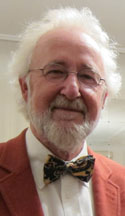 Prof. Willmar Sauter has a longstanding and broad international experience as president of the International Federation for Theatre Research (IFTR, 1991–95), for which he also has organized a Working Group on the Theatrical Event (since 1997). He has lectured in many countries, including India, China and Japan. He has also served as Dean at Stockholm University and is presently the Head of the Research School of Aesthetics.
Prof. Willmar Sauter has a longstanding and broad international experience as president of the International Federation for Theatre Research (IFTR, 1991–95), for which he also has organized a Working Group on the Theatrical Event (since 1997). He has lectured in many countries, including India, China and Japan. He has also served as Dean at Stockholm University and is presently the Head of the Research School of Aesthetics.
Prof. Sauter has developed the theory of the Theatrical Event in a number of books and articles, e g ”Understanding Theatre: Performance Analysis in Theory and Practice” (Stockholm 1995), and ”The Theatrical Event: Dynamics of Performance and Perception” (Iowa City, 2000). This theory has proved to be applicable to a number of research objectives, since it brings together the performer and the spectator in their social and aesthetic context. As a holistic theory, it is especially suitable for the study of performances outside the traditional Western canon.
In November, 2008, Willmar Sauter lectured at the University of Hyderabad on the topic: ‘Strolling Players, Playing Culture & Cultural Performances: Theoretical and Historical Aspects of Theatrical Events‘. The lecture was organised by the Nordic Centre in India (NCI) in collaboration with the Sarojini Naidu School of Performing Arts, Fine Arts & Communication of the University of Hyderabad.
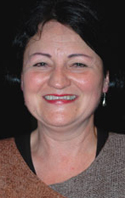
 Associate professor Christina Nygren dedicated more than 20 years of her life to extensive studies of theatre, history and languages in China and Japan, from 1980 onwards spending long periods at universities and academies in the two countries. She defended her doctoral dissertation on ”Encounter between East and West. Metaphor and Convention in a Japanese Shingeki Performance” in 1993.
Associate professor Christina Nygren dedicated more than 20 years of her life to extensive studies of theatre, history and languages in China and Japan, from 1980 onwards spending long periods at universities and academies in the two countries. She defended her doctoral dissertation on ”Encounter between East and West. Metaphor and Convention in a Japanese Shingeki Performance” in 1993.
During the second half of the 1990’s she was involved in a research project on popular culture in these countries, with extensive field work financed by the Swedish Council for Research in the Humanities and Social Sciences (HSFR/R). The project was tilted ”Popular Theatre in Context – An Intercultural Perspecive”, and it was later published as a book called ”Ghosts, Generals and Gorgeous godesses. Travelling theatres, religious festivals and popular amusement in contemporary Japan and China” (Carlssons, 2000). Read a review of the book, written by Magnus Fiskesjö.
Between 1999 and 2004 Christina Nygren collaborated in a research project run by the Department of Oriental Languages at Stockholm University (but with shared responsibility by several universities in Sweden). As part of a major comparative research project on ”Literature and Literary History in Global Contexts” Nygren was a member of the Working group 2, focusing on ”Literary Genres: An Intercultural Approach”; and Working group 3, ”Encounters between Literary Cultures in the 19th and 20th Centuries”. The project was funded by the Swedish Research Council.
In late 2006, the project finally materialised in a set of four volumes being published by Walter de Gruyter in Berlin & New York. Christina Nygren has written two articles titled ”Drama for learning and pleasure: Japan, China and India in a comparative perspective”, and ”Appropriations of European theatre in Japan, China and India” respectively. More information
 From the beginning of the 1990’s Christina Nygren has more and more turned her attention towards India and Bangladesh, and has for periods been connected to the Department of Oriental Languages at Stockholm University, most recently during the academic year 2010/11.
From the beginning of the 1990’s Christina Nygren has more and more turned her attention towards India and Bangladesh, and has for periods been connected to the Department of Oriental Languages at Stockholm University, most recently during the academic year 2010/11.
During the period 2000–2004, she carried out a research project entitled ”Perspectives on Popular Theatre – Bengal as religious, artistic and social context for popular theatre and dance”, financed by Stockholm University ”faculty resource” funds. The project was carried out in collaboration with the National Museum, Centre For Asian Studies and the National Yatra Association, all in Bangladesh; amd the Rabindra Bharati University and the Paschimbanga Natya Akademy in Kolkata, India. The project focused on the popular forms of theatre prevalent in Bengal, especially yatra, and is based on extensive visits to cities and villages in the Indian state of West Bengal and in Bangladesh. It resulted in a book titled ”Brokiga Bengalen, Resande teatersällskap, religiösa festivaler och populära nutida nöjen i indiska Västbengalen och Bangladesh”, published in 2006. More information about the book.
When this project was finished she proceeded with a wider comparatibe research project on the theatre sector in the entire region of South and East Asia, including Nepal, Sri Lanka, Vietnam, Laos and China. This project was funded by Sida/SAREC.
In 2011 Christina Nygren has been involved in three research projects:
– The Manifestations of Mysticism, a study of contact and communication between the mysticist traditions of three world religions, namely Islam, Hinduism, and Buddhism.Mystikens manifestationer, en undersökning av kontakt och kommunikation inom de mystiska traditionerna av tre världsreligioner förankrade i Asien – islam, hinduism och buddhism.
– The Cult of the Tiger in Sundarbans Jungle. A pilot study in the southern parts of Bengal (Bangladesh and West Bengal).
– The Communication Pattern of Popular Culture – Performativity and Polarisation. Part of a a coming larger research project with other researchers.
For more information on Christina Nygren’s research, publications and other activities, see her web page entitled Asienkontakt. http://asienkontakt.net/
Cultural activities
Over the years Christina Nygren has also been very productive as a freelance writer on Performing Arts and Popular Culture in Asia. Go for a list of her publications.
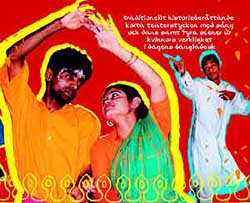 • Bangladeshi theatre group performed in StockholmT • Bangladeshi theatre group performed in StockholmT he Bangladeshi Theatre troupe Rupantar, part of a Khulna-based NGO working professionally with drama, dance, and music, gave performances in Stockholm 27–28 March 2004. Rupantar has an ambition to increase people’s consciousness about democracy, equality, environment and children’s rights through their plays. They have also drawn attention to the plight of Bangladesh’s unique mangrove forests, the Sundarbans. This is combined with with developing a new way of expressing themselves called ALT (Alternative Living Theatre), inexpensive performances based on body language and frequent use of make-up. The performances in Stockholm were arranged by Svensk Teaterunion, and took place at Aliasteatern and at Etnografiska Museet. he Bangladeshi Theatre troupe Rupantar, part of a Khulna-based NGO working professionally with drama, dance, and music, gave performances in Stockholm 27–28 March 2004. Rupantar has an ambition to increase people’s consciousness about democracy, equality, environment and children’s rights through their plays. They have also drawn attention to the plight of Bangladesh’s unique mangrove forests, the Sundarbans. This is combined with with developing a new way of expressing themselves called ALT (Alternative Living Theatre), inexpensive performances based on body language and frequent use of make-up. The performances in Stockholm were arranged by Svensk Teaterunion, and took place at Aliasteatern and at Etnografiska Museet. |
Besides pure research work Christina Nygren has been travelling extensively in Asia, participating in workshops and seminars. In 1992 she visited the traditional Dance Festival in Khajuraho and the Festival of Modern Theatre in New Delhi, and later on participated in an International Seminar on the ”Impact of International Interaction in Contemporary Theatre” and a theatre festival in Dhaka, Bangladesh.
In 1994 she worked as a visiting lecturer in Bangladesh, invited by the Centre for Asian Theatre and the universities in Dhaka and Chittagong. In 1995 she took part in a joint project on ”Probable Application of Western Drama in Indian Theatre” together with Kamaluddin Nilu, Bangladesh. Exchange contacts were also established with the National School of Drama in New Delhi and Kolkata University.
Nygren was co-ordinator of an international seminar with lectures and discussions on ”Theatre in human life” in November 1996, at the occasion of the Stockholm University Dept. of Theatre’s 50th anniversary. In January 2003 she was the keynote speaker at the International Federation for Theatre Research(IFTR’s) world conference in Jaipur, India, speaking on ”Travelling Theatre in Japan, China, India and Bangladesh”.
Between 2002 and 2009, Christina Nygren was a project leader for a collaboration project in the field of theatre and dance for children and youth in Southeast and East Asia (funded by Sida and the Swedish International Theatre Institute, ITI), assigned to undertake an extended project proposal in the same region, including Vietnam, Laos and China.
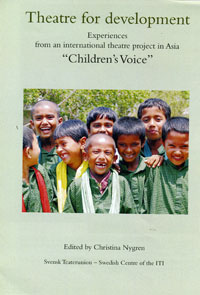 Besides this she was also on part-time project leader involved in a five-year project called ”Voices of the Children” (Barnens Röst), aimed at strengthening children’s theatre in Asia. This project is also funded by Sida and includes an exchange of Swedish and Indian/Bangladeshi theatre groups during 2004 and 2005. The first group to visit Sweden was the Rupantar group from Khulna, Bangladesh, that performed in Stockholm in March 2004 (see box above to the right).
Besides this she was also on part-time project leader involved in a five-year project called ”Voices of the Children” (Barnens Röst), aimed at strengthening children’s theatre in Asia. This project is also funded by Sida and includes an exchange of Swedish and Indian/Bangladeshi theatre groups during 2004 and 2005. The first group to visit Sweden was the Rupantar group from Khulna, Bangladesh, that performed in Stockholm in March 2004 (see box above to the right).
In February 2005 the Swedish puppet theatre group Tittut visited Bangladesh, where they organised a workshop in Khulna. Another two theatre groups have visited India/Bangladesh recently as paret of the Sida project, namely Teater Pero from Stockholm and Slava Theatre from Huddinge. More information about the project.
The Voices of the Children project was completed in 2009, and resulted in the publication of a book, entitled ”Theatre for Development. Experiences from an international theatre project in Asia”.
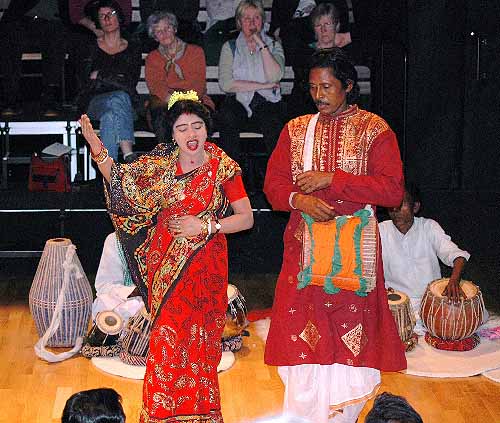 As an activity completely separate from the Sida project Christina Nygren in March 2005 organised a tour to Sweden of ten folk musicians, dancers and singers from Purulia, in the western part of the Indian state of West Bengal, to Sweden in March 2005.
As an activity completely separate from the Sida project Christina Nygren in March 2005 organised a tour to Sweden of ten folk musicians, dancers and singers from Purulia, in the western part of the Indian state of West Bengal, to Sweden in March 2005.
The group gave a performance called ”Bengali Night” featuring suggestive so-called jhumu music and nachnidance (by Shonda Rani), at Södra Teatern in Stockholm on Friday 11 March 2005. A group of baulsingers from the same region also took part in the show.
The day before the performance in Strockholm, on Thursday 10 March 2005, Christina Nygren organised a seminar on ”Traditional Bengali theatre, culture and music” with the ten artists from Purulia. The seminar was held at Tonsalen in the Slava Theatre in Huddinge, south of Stockholm. Shonda Rani danced along with Balaram Singh Sardar, playing the madhol drum (photo to the right). More information on the Huddinge seminar.
In previous years she has similarly engaged in suggesting, facilitating and introducing many other Chinese, Indian and Bangladeshi artists coming to Sweden for guest performances at e g Göteborg Dance- and Theatre Festival in 2000 and 2002, and the Re:Orient festival in Stockholm 2003. As a free lancer she even produced a number of programs for Swedish Radio with Baul artists from Bangladesh.
On Thursday 8th December 2011, Christina inaugurated a new shop in Stockholm – Brokiga Bengalen, selling Bengali handicrafts, The shop is intended to become a meeting point for Bengali cultural activities in Stockholm. Both the Indian Ambassador, Mr. Ashok Sajjanhar, and the First Secretary of the Embassy of Bangkadesh, Mr. Masudul Alam, participated in the inuguration. More information. 
Workshop on Marginalized Performance Practices in India
In September 2009, Prof. Willmar Sauter received a SASNET planning grant, for the organisation of an interdisciplinary workshop entitled ”Interdisciplinary Approaches to Marginalized Performance Practices in India”. More information about the 2009 SASNET planning grants.
The aim was to bring together scholars with different disciplinary backgrounds to examine whether and/or how the marginalized performance practices in India reflect and respond to changing social, political and cultural conditions.
Abstract: Any performative practice offers a broad range of possibilities for conceptual, contextual, critical and aesthetic analysis of the society and the aspirations of the society members. Our intention is to shed light on India’s marginalized performance practices from inter- and intra-disciplinary perspectives exploring both conceptual premises and applications, as well as means of preserving and mediating the performances to the scholars and wider audiences for further investigation. The issue of marginalized groups in the Indian society has attained interest only in the recent decade and unless the oral performance practices are made known and available, the tradition will likely remain marginalized.
Marginalized performance practices are understood here as (i) performances which fall in the category of folk theatre (contrasted to institutionalized ‘high’ theatre) in its broad sense including narration, recitation, dialogue, singing and dancing; (ii) performances practiced by performers belonging to the marginalized groups (adivasis, low caste groups, dalits, religious minorities, gender related minorities such as females and the third gender, and sexual minorities); (iii) performances employing not officially recognized local and regional languages and dialects; (iv) performances set up in geographically and politically peripheral locations such as interstate border regions or suburban neighborhoods. One or more of the categories qualify for the definition of a marginalized performance.
The workshop, held in Ytterjärna 2–5 June 2010, opened with presentations and discussions of the current research that each of the participants is or has been involved in. Aspects of terminology, definitions and methods were rapidly included into the group’s reflections. Theatre, dance, rituals, ceremonies, linguistic aspects as well as isues of documentation, research aims and possibilities were intensively discussed during two days. Also ethical and epistemological questions were raised. Based on the discussions and on the presentations of audiovisual materials, the group decided to pursue the establishment of an India-based project, called ‘Marginalized Performance Practices: Documentation Project’. Physically, a data base will be built up, using already existing facilities at JNU in New Delhi with support from the University of Hyderabad. The collaboration with departments at Stockholm University (Theatre and Dance, Indology, Computer Science) will be coordinated by NCI. The participants of the workshop agreed upon a statement outlining the overall purpose of the project, terms of participation and perspectives on its future development.
Besides Prof. Sauter and Associate Professor Christina Nygren from the Dept. of Musicology and Performance Studies, researchers at a number of other Swedish and Indian departments participated in the workshop:
At Stockholm University:
– Dr. Mirja Juntunen, Lecturer at the Dept. of South and Central Asian Studies and ForSCAS (and Director of the Nordic Centre in India).
– Researcher Nikos Dimitrakas, Dept. of Computer ScienceIn India:
– Prof. H.S. Shiva Prakash, Dean of the Faculty School of Arts & Aesthetics, Jawaharlal Nehru University (JNU), New Delhi. Prof. Prakash regularly lectures on ‘Documenting Traditional and Marginalized Performance’ at the Department of Performing Arts at JNU.
– Ass. Prof. Bishnupriya Paul, School of Arts and Aesthetics, JNU
– Prof. B. Anandhakrishna, Head of the Sarojini Naidu School of Performing Arts, University of Hyderabad, who has documented a large number of performance traditions of South India.
Rabindranath Tagore 150th anniversary celebration
2011 was the 150th birth anniversary year of the great myriad-minded Indian/Bengali poet, philosopher and Nobel Laureate Rabindranath Tagore (1861–1941). Celebrations were organised also in Sweden, to a large part due to efforts by SASNET. In late September 2011, a series of anniversary celebrations took place with kind support from the embassies of India in Stockholm and Copenhagen, and the Indian Council for Cultural Relations (ICCR) in Delhi.
Thereby, three eminent international Tagore scholars – Professor William Radice, SOAS, University of London, UK; Dr. Reba Som, ICCR Rabindranath Tagore Centre in Kolkata, India; and Professor Asoke Bhattacharya, Jadavpur University, Kolkata, India – could be invited to do a Scandinavian tour. During the period 19–23 September 2011, academic seminars were held at Copenhagen University (19th), Lund University (21st), Stockholm University (22nd) and Uppsala University (23rd). Full information about the Swedish Tagore anniversary programmes.
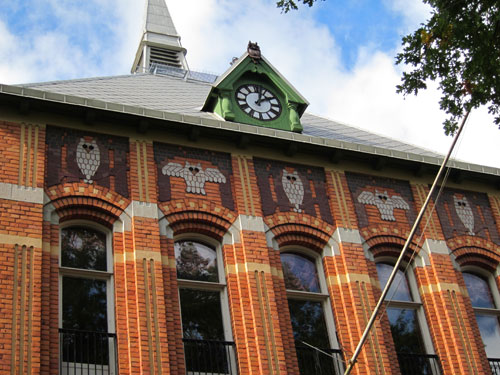


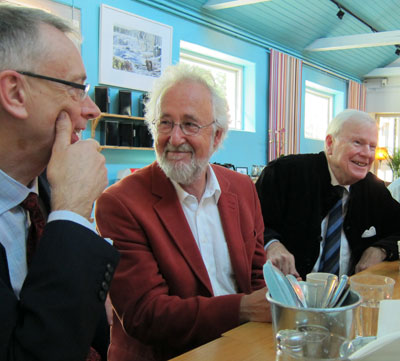 The seminar at Stockholm University was held on Thursday 22 September. This full-day programme was jointly organized by the Dept. of Theatre and Dance Studies and the Dept. of Oriental languages, and it was coordinated by Professor Willmar Sauter and Dr. Christina Nygren. It was held in the auditorium at the Dept. of Oriental Languages, Kräftriket 4A.
The seminar at Stockholm University was held on Thursday 22 September. This full-day programme was jointly organized by the Dept. of Theatre and Dance Studies and the Dept. of Oriental languages, and it was coordinated by Professor Willmar Sauter and Dr. Christina Nygren. It was held in the auditorium at the Dept. of Oriental Languages, Kräftriket 4A.
(Photo of Prof. Sauter in conversation with Prof. Radice. Prof. Kjell Espmark to the right.)
Besides lectures by the three international speakers (the same as in Copenhagen and Lund), the organisers had also invited a few complimentary Swedish speakers, namely Professor Kjell Espmark from the Nobel Prize Committee/Swedish Academy, who spoke on “Tagore and the Nobel Prize”; and Dr Stephan Larsen, Department of Literature, Stockholm University, who spoke on “Early Swedish translations of Tagore”. Bubu Munshi Eklund from Lund was specially invited to sing Rabindrasangheet with her excellent timbre.
Unfortunately, Dr Olavi Hemmilä, Comparative Literature, Dalarna University, had to cancel his participation due to illness. He was supposed to speak on ”Tagore’s tour to Sweden and impact on the writings of Dan Andersson”.
See the full programme for the Stockholm seminar.
See Lars Eklund’s photos.
The Indian Ambassador invited the speakers and organisers of the Tagore event in Stockholm to a reception in the evening. It was held at the Ambassador’s residence, and coincided with a visit to Sweden by the Indian Minister of Communications and Information Technology, Mr. Kapil Sibal.